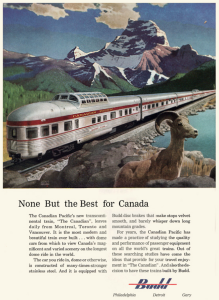 When Transport Minister Jean-Luc Pepin lowered Ottawa’s axe on VIA’s exposed neck in the first of several cuts beginning in November 1981, he said it was necessary to free up funding to buy Bombardier’s problem plagued Light, Rapid, Comfortable (LRC) trains. He added that “some” might run outside the Quebec-Windsor Corridor. They didn’t.
When Transport Minister Jean-Luc Pepin lowered Ottawa’s axe on VIA’s exposed neck in the first of several cuts beginning in November 1981, he said it was necessary to free up funding to buy Bombardier’s problem plagued Light, Rapid, Comfortable (LRC) trains. He added that “some” might run outside the Quebec-Windsor Corridor. They didn’t.
Some of the trains cut by the Liberals returned briefly in 1985 due to the hollow promises made by the Conservatives the year before, although their glowing pre-election rhetoric conveniently omitted a date for vital VIA modernization. The result was a January 1990 chop deeper than the Liberals had delivered in 1981.
Gone with the stroke of a pen on the order-in-council that killed the trains was half of VIA. This included The Canadianon its original CP Toronto-Vancouver route along the Lake Superior North Shore and the daily Winnipeg-Vancouver Super Continental, which was replaced by a tri-weekly Faux Canadian using the CP stainless steel equipment on the CN route three times weekly and priced beyond the budgets of many Canadians. That paltry service is now down to twice weekly.
So, will any of these trains in modern form ever return to serve all those “hardworking Canadians in all those hardscrabble towns yearning for existential change” that the politicians invariably reference in their feel-good speeches?
It’s unlikely, but that doesn’t make it less necessary. With the loss of most intercity bus services in recent years and the deplorable, unaffordable air service being served up, a network of modern regional passenger trains could and should once again link many points on various medium-distance routes across the country, including Northern Ontario.
Modern self-propelled diesel-electric trainsets – which can also be powered by any combination of batteries, hydrogen cells or straight overhead AC power – that were originally designed for European service are now finding homes in the U.S. and on Ottawa’s O-Train commuter line. They’d be ideal. They’re fast, economical, environmentally sound and safe for use on existing lines. Some infrastructure tweaks to ensure the passenger and freight trains don’t get entangled would complete this package.
Considering the $15 billion in debt being carried by Canada’s airport authorities, which will inevitably become the public’s problem, and the $10 billion in pandemic relief funding for the aviation sector, such a rail investment would be a bargain.
Equally insulting to current and potential rail passengers is the federal government’s latest fantasy rail plan for – you guessed it – the Quebec-Windsor Corridor. It has been promoted as being “freight-free,” implying it will run entirely on dedicated passenger tracks. ‘Taint so. It will require access to a considerable amount of freight trackage to get in and out of major cities.
The label slapped on this dream scheme is high frequency rail (HFR), which is meaningless. Any decent rail service – no matter what the speed – must provide numerous departures and arrivals spread throughout the day to appeal to travellers.
By mid-2022, HFR had devoured $974.8 million for consulting studies, none resulting in an actual plan, although the lines on this Toronto-Ottawa-Montreal fantasy’s map has grown to include Quebec City and perhaps Windsor. As the public’s cash flows, the government refuses to apply a sticker price. Minister of Transport Omar Alghabra retracted his earlier guess of about $12 billion. He now just says “many billions.”
There’s more to this politically-motivated dream scheme to grind the gears of anyone hoping for better rail service in Northern Ontario, on the Prairies or out in the Maritimes. Delivering more carloads of detail here would be cruel.
But never fear. The chances of this back-of-the-napkin scheme being built are comparable to the formation of icicles in Hades. It will add up to nothing more than vast quantities of public cash frittered away at a time when the entire nation is crying out for improved and affordable travel options. As has always been the case, the missing ingredients remain political desire, political will and political commitment.
I’ve always been especially fond of Northern Ontario, dating back to the first of my many visits since I saw the region north of the French River through the windows of CP’s original version of The Canadian in 1968. Those visits have given me an appreciation of the region’s potential and its need to be better connected internally and with all the other regions that have been given the shaft many times.
If these indignant words help start a northern rail passenger fire, I’d be delighted. I believe I can say the same for numerous friends who’d use the trains, such as my transplanted Ontario friend in Brandon and several other friends across Northern Ontario.
All aboard?
- The Great Train Robbery – Part 2 - June 12, 2023
- The Great Train Robbery – Part 1 - March 19, 2023
- Railroaded: A National Train Wreck - February 3, 2023
 Wawa-news.com Local and Regional News
Wawa-news.com Local and Regional News


